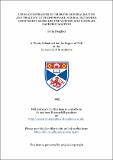Files in this item
Using constraints to improve generalisation and training of feedforward neural networks : constraint based decomposition and complex backpropagation
Item metadata
| dc.contributor.advisor | Buturuga, Dumitru | |
| dc.contributor.advisor | Giumale, Cristian | |
| dc.contributor.advisor | Dan Serbanati, Luca | |
| dc.contributor.author | Draghici, Sorin | |
| dc.coverage.spatial | 358 p. | en_US |
| dc.date.accessioned | 2018-05-22T14:34:40Z | |
| dc.date.available | 2018-05-22T14:34:40Z | |
| dc.date.issued | 1996 | |
| dc.identifier.uri | https://hdl.handle.net/10023/13467 | |
| dc.description.abstract | Neural networks can be analysed from two points of view: training and generalisation. The training is characterised by a trade-off between the 'goodness' of the training algorithm itself (speed, reliability, guaranteed convergence) and the 'goodness' of the architecture (the difficulty of the problems the network can potentially solve). Good training algorithms are available for simple architectures which cannot solve complicated problems. More complex architectures, which have been shown to be able to solve potentially any problem do not have in general simple and fast algorithms with guaranteed convergence and high reliability. A good training technique should be simple, fast and reliable, and yet also be applicable to produce a network able to solve complicated problems. The thesis presents Constraint Based Decomposition (CBD) as a technique which satisfies the above requirements well. CBD is shown to build a network able to solve complicated problems in a simple, fast and reliable manner. Furthermore, the user is given a better control over the generalisation properties of the trained network with respect to the control offered by other techniques. The generalisation issue is addressed, as well. An analysis of the meaning of the term "good generalisation" is presented and a framework for assessing generalisation is given: the generalisation can be assessed only with respect to a known or desired underlying function. The known properties of the underlying function can be embedded into the network thus ensuring a better generalisation for the given problem. This is the fundamental idea of the complex backpropagation network. This network can associate signals through associating some of their parameters using complex weights. It is shown that such a network can yield better generalisation results than a standard backpropagation network associating instantaneous values. | en_US |
| dc.language.iso | en | en_US |
| dc.publisher | University of St Andrews | |
| dc.subject.lcc | QA76.87D8 | |
| dc.subject.lcsh | Neural networks (Computer science). | en |
| dc.title | Using constraints to improve generalisation and training of feedforward neural networks : constraint based decomposition and complex backpropagation | en_US |
| dc.type | Thesis | en_US |
| dc.contributor.sponsor | Committee of Vice-Chancellors and Principals of the Universities of the United Kingdom | en_US |
| dc.contributor.sponsor | University of St Andrews | en_US |
| dc.type.qualificationlevel | Doctoral | en_US |
| dc.type.qualificationname | PhD Doctor of Philosophy | en_US |
| dc.publisher.institution | The University of St Andrews | en_US |
This item appears in the following Collection(s)
Items in the St Andrews Research Repository are protected by copyright, with all rights reserved, unless otherwise indicated.

